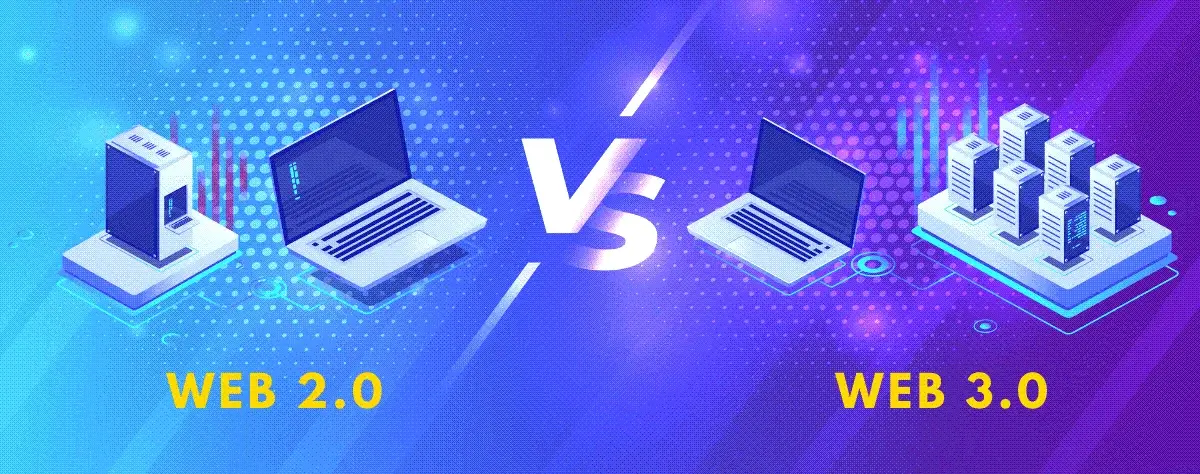Services Comparison: Web 2.0 vs. Web 3.0
by
-
5 minutes read
-
March 30, 2021

Introduction
The evolution of the internet has not only transformed the way we communicate and access information but has also revolutionized the services we rely on. Web 2.0 and Web 3.0 are two distinct phases of this evolution, each introducing significant changes to the types of services available to users. In this blog, we will dive deep into the comparison of services offered by Web 2.0 and Web 3.0, highlighting their differences, advantages, and potential impact on various aspects of our lives.
Web 2.0 Services: Enabling User Interaction
Web 2.0, often referred to as the ‘Social Web‘, brought a wave of interactivity and user-generated content, transforming the landscape of online services. Let‘s explore some of the key services that flourished during the Web 2.0 era:
- **Social Networking Platforms**: Web 2.0 introduced platforms like Facebook, Twitter, and LinkedIn, enabling users to connect, share updates, and build online communities. These platforms became central to social interactions and information dissemination.
- **Blogging and Content Sharing**: Blogging platforms such as WordPress and Blogger empowered individuals to create and share content easily. The rise of YouTube allowed users to share video content, while platforms like Flickr focused on photo-sharing.
- **Collaborative Tools**: Services like Google Docs and Dropbox revolutionized collaboration by enabling real-time document sharing and editing, streamlining teamwork and productivity.
- **E-Commerce**: Online marketplaces like Amazon and eBay allowed users to buy and sell products globally, opening up new avenues for businesses and consumers alike.
- **Entertainment Streaming**: Services like Netflix and Spotify disrupted traditional media consumption by offering on-demand streaming of movies, TV shows, and music.
Web 3.0 Services: Decentralization and Beyond
Web 3.0, the ‘Decentralized Web‘ is characterized by its focus on blockchain technology, smart contracts, and decentralized applications (DApps). This has led to the emergence of innovative services that challenge traditional norms:
- **Decentralized Finance (DeFi)**: DeFi platforms on Web 3.0 allow users to engage in financial activities like lending, borrowing, and trading without intermediaries. Smart contracts automate transactions and ensure transparency.
- **Non-Fungible Tokens (NFTs)**: NFT platforms enable the creation, buying, and selling of unique digital assets, including digital art, collectibles, and virtual real estate.
- **Decentralized Social Networking**: Web 3.0 introduces platforms that aim to give users full control over their data and interactions, minimizing the role of centralized entities in social networking.
- **Supply Chain Management**: Web 3.0 enhances supply chain transparency by utilizing blockchain technology to track and verify the origin and authenticity of products.
- **Decentralized Identity Services**: Users can control their digital identities securely on Web 3.0, enabling them to share only necessary information while protecting their privacy.
Comparative Analysis
- **Centralization vs. Decentralization**:
- Web 2.0: Services are often centralized, relying on intermediaries for data storage, transactions, and user interactions.
- Web 3.0: Services are decentralized, leveraging blockchain technology and smart contracts to eliminate intermediaries and provide greater user control. - **Data Ownership and Privacy**:
- Web 2.0: Users often surrender their data to platforms, raising concerns about data privacy and security.
- Web 3.0: Users have ownership of their data, and privacy is prioritized through decentralized systems and encryption. - **Interoperability and Collaboration**:
- Web 2.0: Services may lack interoperability, limiting seamless integration and data sharing between platforms.
- Web 3.0: Interoperability is encouraged, fostering collaboration between different DApps and ecosystems. - **Monetization Models**:
- Web 2.0: Monetization typically relies on advertising, subscription fees, and data monetization by platforms.
- Web 3.0: Monetization involves token-based models, enabling direct transactions and new revenue streams through DeFi and NFTs. - **Innovation and Flexibility**:
- Web 2.0: Innovation is often constrained by the limitations of centralized platforms and business models.
- Web 3.0: The open and decentralized nature of Web 3.0 encourages innovation and allows for rapid development of new services.
Impacts on Industries
- **Finance and Banking**:
- Web 3.0‘s DeFi services disrupt traditional banking, enabling borderless transactions, lending, and yield farming. - Art and Entertainment:
- NFT platforms revolutionize the way digital art, music, and media are created, shared, and monetized. - **E-Commerce**:
- Web 3.0‘s decentralized marketplaces eliminate middlemen, reducing fees and enabling direct peer-to-peer transactions. - Healthcare:
- Decentralized identity services and secure data sharing on Web 3.0 improve patient data management and interoperability. - **Supply Chain and Logistics**:
- Web 3.0 ensures product authenticity and transparency by allowing real-time tracking of goods.
Conclusion
The shift from Web 2.0 to Web 3.0 brings profound changes to the services we use daily. While Web 2.0 focused on user interaction and collaboration, Web 3.0 emphasizes decentralization, data ownership, and blockchain technology. This transition has implications for various industries, from finance and entertainment to e-commerce and healthcare. As Web 3.0 continues to evolve, it has the potential to reshape business models, empower individuals, and foster innovation in ways that were previously unimaginable. As users and creators, embracing these changes will allow us to navigate the dynamic landscape of the digital era and unlock new opportunities across diverse sectors.